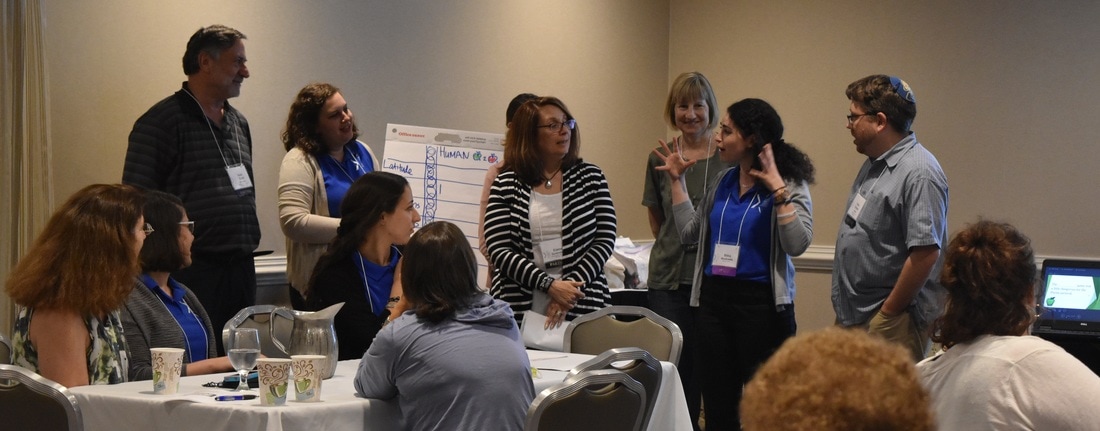Return to Education Newsletter main page! |
Train like a Marathoner… For Your Best High Holy Days Yet!
By Rachel Fraade, Lawrence Magdovitz ISJL Education Fellow
As soon as our summer visits finish, the ISJL office buzzes for another reason – it’s time to prepare for the High Holy Days. We all know that Rosh haShanah and Yom Kippur are intense days, no matter how we choose to observe them. They may be physically and emotionally draining, but they can also be deeply meaningful – as long as we don’t get overwhelmed. How can we make sure we are ready to observe the High Holy Days from a place of calm and community? My solution: treat them like a marathon. Several years ago, I decided that it was time to run my first marathon. After a few months of training, I started to feel a shooting pain in the side of my leg. I went to the doctor and discovered that I was injured – the marathon was off. One semester of physical therapy later, I recovered; the following year, I tried again. This time, I made sure to do more than run. I prepared myself mentally and physically. I planned runs, but I was conscious of the weaker parts of my body and made sure to train those as well. I gave myself days off when my body was telling me to do so. That time, I completed the race – and learned some valuable lessons along the way. I found that a single-minded approach to marathon training only harmed me. When I logged high mileage five days a week, my body couldn’t handle it. Likewise, focusing only on High Holy Days preparation can burn you out on the holidays before they even arrive. While it’s critical to prepare, sometimes your best ideas will come after you’ve been working on something else. Take a walk, focus on something unrelated, or have a chat with a co-worker. Maybe they’ll give you an entirely new idea! As educators, we may feel pressure to provide our communities with a positive High Holy Days experience. That is an important responsibility that we must not take lightly. Yet, it should never come at the expense of our own observance and enjoyment of the holidays. Though we should not be single-minded, preparation is still critical. Running for hours on end alone is not just physically tiring – it takes a lot out of you emotionally. The exchanges we have around the High Holy Days are also draining. Apologies, memories, and meaningful conversations can really exhaust you; but preparing in advance can make them less overwhelming. We can begin making our apologies in advance, and we can engage in discussions around mistakes or hurtful behavior. Then when the holidays come, we will not feel as pressured to rehash every conflict within a matter of days. We can prepare as many resources as possible for our students, rehearse when possible, and ask for support from our communities. If you’re a coffee drinker, start cutting back a week before Yom Kippur. The days themselves may still be long – no matter how many training runs you do, a marathon is always more difficult. But you’ll feel a lot better if you prepare, and you’ll certainly be glad that you did. Lastly, it is important to take the time to care for yourself. When I was training for my marathon, I made sure to get enough sleep and eat foods that fueled my running. When we are in the midst of this whirlwind time of year, we must unwind at the end of the day. We are at our most creative when we’re relaxed and well-rested – read a book, get some sunshine, or catch up with a friend over coffee. None of us can handle this time of year alone, and we cannot do all of our preparation in one shot. It is critical to prepare in advance, care for ourselves, and work with our communities. Our High Holy Days should be well-planned and executed, but we should not let them overwhelm us. Ultimately, they are holidays for us to reconnect with our spirituality and best selves. As I prepare materials for the High Holy Days, I am making sure to intersperse that work with other projects. I relax with books, runs, and walks around our office park. It can be difficult to balance my own needs with the volume of work to be done, but I have confidence that it can be done. When the High Holy Days arrive, I will be calm and centered. My work will be done, but not at the expense of my own spiritual preparation. I am putting in the miles now, and I know they will pay off in the final product. Shanah tovah (a good year)! |
- Home
- WHO WE ARE
-
WHAT WE DO
- PODCAST
- Conference >
- Education >
-
CULTURE
>
- Culture Overview
- Cultural Programming >
-
History
>
-
Encyclopedia of Southern Jewish Communities
>
- Alabama Encyclopedia
- Arkansas Encyclopedia
- Georgia Encyclopedia
- Florida Encyclopedia
- Kentucky Encyclopedia
- Louisiana Encyclopedia
- Mississippi Encyclopedia
- North Carolina Encyclopedia
- Oklahoma Encyclopedia
- South Carolina Encyclopedia
- Tennessee Encyclopedia
- Texas Encyclopedia
- Virginia Encyclopedia
- Encyclopedia Credits
- Oral History
-
Encyclopedia of Southern Jewish Communities
>
- SPIRITUALITY >
- DONATE
- Shalom Y'all
- Strategic Plan
- Southern & Jewish Blog
- Calendar
- Virtual Press Kit
|
©2024 Goldring/Woldenberg Institute of Southern Jewish Life
|

